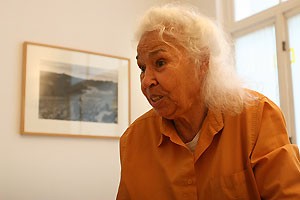Biography

Egyptian writer and feminist Nawal el Saadawi was born in 1931 in the village of Kafir Tahla. Her father, an official in the Egyptian Ministry of Education, provided all nine of his children with a university education. El Saadawi qualified as a doctor in 1955 in Cairo. She has published at least twenty-four books in Arabic and is popular among English speaking audiences. Despite her literary success, El Saadawi has been repeatedly punished by the Egyptian government because her experiences. She is a prominent feminist activist who writes about the taboo issues of womanhood and sexuality. She is also a prominent advocate working against female genital mutilation. (See also Women, Islam and the Hijab)
El Saadawi was dismissed from her position of Director of Public Health in the Ministry of Health with the 1972 publication of Woman and Sex, which angered political and theological authorities. She also lost her positions as the Chief Editor of a health journal, and as the Assistant General Secretary in the Medical Association in Egypt. From 1973 to 1976 she researched women and neurosis in the Ain Shams University’s Faculty of Medicine, and from 1979 to 1980 she was the United Nations Advisor for the Women’s Programme in Africa and Middle East. (See Gender and Nation, Frantz Fanon)
In 1981, she was arrested and imprisoned along with other Egyptian intellectuals under Anwar Sadat’s regime. She was released upon Sadat’s death in 1982, and shortly thereafter founded the Arab Women’s Solidarity Association (AWSA), an international organization dedicated to “lifting the veil from the mind” of Arab women. In 1985, AWSA was granted consultant status with the Economic and Social Council of the United Nations as an Arab non-governmental association. Despite the association’s obvious success, the Egyptian government closed AWSA down in 1991 and diverted its funds to a religious women’s association. Using twelve lawyers who volunteered to help her, El Saadawi took the Egyptian government to court, but did not win the case. (See Angela Davis)
In 1988, she left Egypt and went to the United States where she held many prestigious teaching appointments at universities, including Duke, Harvard and Georgetown. In 1996 she moved back to Egypt and has continued her active writing and political career. In 2004, she won the North-South prize from the council of Europe and in 2005, the Inana International Prize in Belgium. In 2012, she received the The Stig Dagerman Award, a Swedish award honoring advocates of free speech.
English Translations of El Saadawi’s Works
- Saadawi, Nawal el. The Fall of the Imam. London: Minerva, 1988.
- —. God Dies by the Nile. London: Zed Books, 1985.
- —. The Hidden Face of Eve. London: Zed Books, 1980.
- —. The Innocence of the Devil. Berkeley: University of California Press, 1994.
- —. Love in the Kingdom of Oil. London: Saqi Books, 2001.
- —. The Novel: Northampton, Mass: Interlink Books, 2009.
- —. Searching. London: Zed Books, 1991.
- —. Two Women in One. Seattle: Women in Translation, 1991.
- —. Woman at Point Zero. London: Zed Books, 1983.
- —. Zeina. London: Saqi Books, 2011.
Work Cited
- Al-Ali, Nadje Sadig. Gender Writing: Writing Gender. Cairo: The American University in Cairo Press, 1994.
- Malti-Douglas, Fedwa. Men, Women, and God(s). Los Angeles: University of California Press, 1995.
Author: Nicola Graves, Spring 1996
Last edited: May 2017
2 Comments
When El Saadawi lost her positions as the Chief Editor of a health journal, then her publication of ‘Woman and Sex’ was great contribution for us in 1972.
I remember reading Two Women in One and it was fascinating. Thanks for your work in this field.